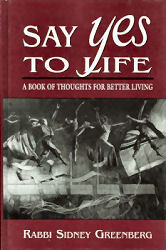
Posted January 18, 2012
A Search for More Abundant LifeTaken from Say Yes To Life: A Book of Thoughts for Better Living
|
 |
The most joyous of all Jewish festivals is Simchat Torah --- “Rejoicing in the Torah.” On that day the reading of Deuteronomy, the last of the Five Books of Moses, is completed: immediately thereafter we begin again the reading of Genesis, the first book of the Torah. Thus the reading of the Torah is never really finished. It continues uninterrupted..
And so does our obligation to study it. We are never relived of that happy privilege.
Perhaps the greatest tribute to continuous Torah study was spoken by the first-century sage: “Turn it again and again, for everything is in it; contemplate it, grow gray and old over it, and swerve not from it, for there is no greater good” (Mishnah Abot 2:14).
Judaism is vitally concerned that we serve God with heart, soul, and might. But it has been no less insistent what we serve Him too with our minds --- with minds that stay open and keep growing.
Someone has said that some minds are like concrete: all mixed up and permanently set. As we grow older, it is very tempting to develop a permanent mind set. But minds, like parachutes are valuable only when open.
To shut the windows of the mind is to court mental and spiritual suffocation. Leonardo da Vinci, who lived to a ripe old age and continued to paint masterpieces into old age, declared, “Learning keeps the soul young and decreases the bitterness of old age.” We must literally never stop going to school, broardening our horizons, and expanding our knowledge.
This is the distinctive Jewish contribution to mental hygiene --- the unparalleled emphasis upon study as a process that only death ought to terminate.
Judah bar Ilai, a seond-century sage, deeply impressed a pagan in the marketplace by his radiant face. “This man,” said the pagan, “must either be intoxicated or he has just discovered a hidden treasure.”
Rabbi Judah overheard him and said” “Friend, I do not drink except when I must for ritual purposes. Neither have I found any treasure. I am a poor man.
“Then what makes your face shine so?”
“That is quite simple,” Rabbi Judah answered, “I study all the time and the quest for knowledge makes the face of a man to shine.”
As long as we keep our minds open and alert, as long as we are willing to try a new skill, entertain a new thought, develop a new friend, surrender an old prejudice --- so long do we remain vital people, so long do we gain ground and move forward in the search for more abundant life.